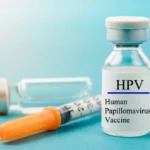
Ghana will, from October 7 to 11, begin a nationwide vaccination campaign against Human Papillomavirus (HPV) for girls aged nine to 14 years.
The exercise will ensure the administration of one dose of the HPV vaccine to girls in efforts to eliminate cervical cancer, the country’s second most common cancer among women.
The Ghana Health Service (GHS) said after the campaign, the HPV vaccine would be integrated into the national routine immunisation for girls from age nine.
Globally, cervical cancer remains the fourth most common cancer among women, with 662,301 new cases and 348,874 deaths reported in 2022.
More than 90 per cent of these deaths occurred in low- and middle-income countries.
In Ghana, 3,072 new cases and 1,815 related deaths were recorded in 2022.
Medical experts linked over 95 per cent of cervical cancer cases to persistent infection with high-risk HPV types, particularly HPV 16 and 18, which account for about 71 per cent of cases worldwide.
To curb this burden, the Ministry of Health and the GHS have adopted a single-dose HPV vaccination strategy using Gardasil 4, manufactured by Merck & Co., Inc.
The vaccine not only protects against HPV 16 and 18 but also against HPV types 6 and 11, which cause anogenital warts and other debilitating conditions.
The upcoming vaccination campaign targets girls aged nine to 14 years, who are known to mount a stronger immune response and are more likely to be vaccinated before HPV exposure.
The GHS says School-based campaigns will serve as the primary delivery approach, with community and health facility options available to reach out-of-school girls.
Health officials say vaccinating 80 per cent of girls within this age group could also reduce HPV infections in boys, contributing to broader community protection.
Recent studies have shown that one dose of HPV vaccine is sufficient to provide long-lasting protection.
Clinical trials in Kenya, India, Costa Rica, and Tanzania all confirmed high efficacy and durable immune responses, with protection lasting at least 10 years.
“These findings make the single-dose schedule both effective and cost-efficient, allowing Ghana to expand coverage and protect more girls,” said health experts.
Health workers are being urged to take the lead in addressing myths and misconceptions about the vaccine.
Some parents wrongly associate HPV vaccination with family planning or early sexual activity, officials emphasized that the vaccine was solely for cancer prevention and has no link to fertility issues.
“HPV vaccines are safe, widely used, and well-studied,” health authorities reassured. “Mild side effects such as pain or redness at the injection site may occur, but no serious adverse effects have been reported.”
To win community trust, health workers are being encouraged to use trusted platforms such as PTA meetings, church groups, and local radio to educate parents.
The HPV vaccination drive aligns with the World Health Organization’s global strategy to eliminate cervical cancer as a public health problem.
The WHO’s “90–70–90” targets aim for 90 per cent of girls to be fully vaccinated by age 15, 70 per cent of women screened at least once in their lifetime, and 90 per cent of women with cervical disease receiving treatment by 2030.
If successful, the strategy could reduce global
cervical cancer incidence by 42 per cent by 2045 and avert more than 62 million deaths by 2120.
Health officials say the introduction of the HPV vaccine marks a turning point in Ghana’s fight against cervical cancer.
One shot protects for years, with strong community support, Ghana can achieve high vaccination coverage and secure a future where cervical cancer is no longer a threat.

